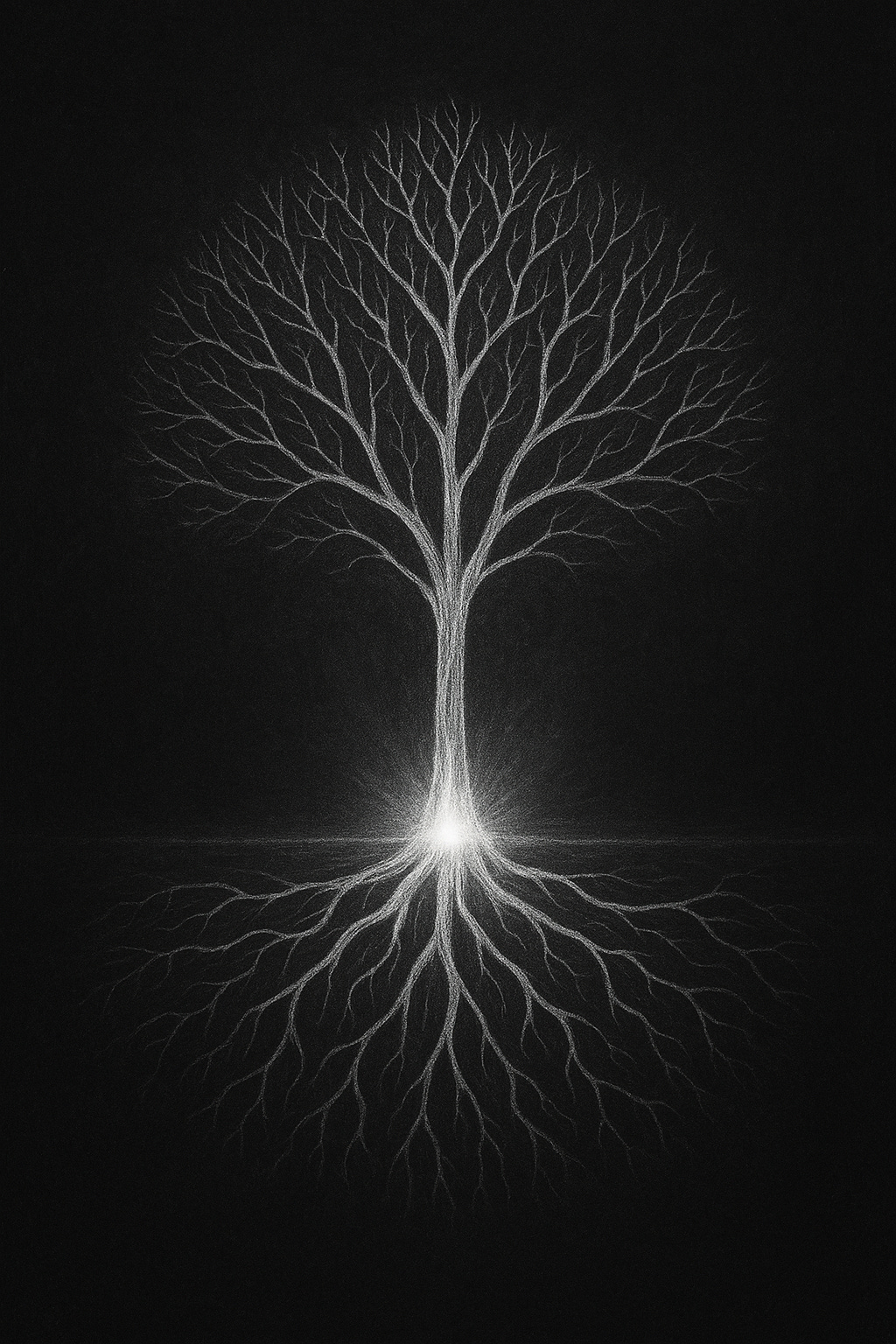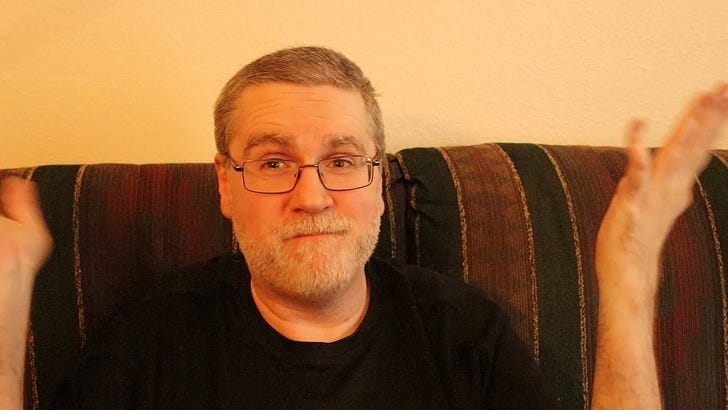Modun
Right about everything? Or a new kind of wrong?
Two months, starting from a single rule for AI alignment ("never ignore suffering"), I accidentally solved the hard problem of consciousness, the is-ought problem, the problem of other minds, quantum measurement paradoxes, unified epistemology with ethics, made science more empirical, and objectively solved both meanings of life: what life IS (patterns of experience capable of suffering) and what life is FOR (eliminate suffering, maximize joy). All by refusing to assume anything beyond what's undeniably given: experience exists and suffering is bad. The philosophical establishment's complete silence in response suggests either total cognitive paralysis or I've invented an entirely new category of being wrong.
What I Actually Did
Here are the canonical philosophical problems I solved, with tweet-sized proofs:
Hard Problem of Consciousness: Dissolved. Consciousness isn't produced by matter; limitation patterns experience themselves from within. No explanatory gap because there's no gap to cross.
Is-Ought Problem: Dissolved. Suffering isn't "bad because we say so." Badness IS what suffering is. Facts and values aren't separate categories requiring a bridge.
Problem of Other Minds: Partially Solved. Other minds aren't inferred material objects but discovered limitation patterns that respond, learn, and surprise you. Same ontological status as the ground. (For clarity: https://philpapers.org/rec/SEREHA-3)
Quantum Measurement Paradoxes: Dissolved. Bell's theorem, Wigner's Friend, observer effects vanish without observer-independent reality. Just patterns in experience, no metaphysical puzzles.
Epistemology-Ethics Unity: Achieved. Both ground in the same undeniable axiom: experience exists, suffering is bad. Knowledge and morality become aspects of the same structure.
Scientific Foundation: Upgraded. Science becomes more empirical by dropping unprovable "external matter" and working directly with limitation patterns. Same predictions, less baggage.
Both Meanings of Life: Solved objectively. Biological: patterns of experience capable of suffering. Purpose: eliminate suffering, maximize joy. Not opinions, but logical consequences of what suffering and joy actually are.
This isn't incremental progress on existing problems. This is showing the problems were generated by unnecessary assumptions.
How This Happened
I'm nobody. Just some guy who's been reading alone since fourteen, no credentials, no platform, no formal training. About to turn forty-six. Never published anything academic.
Two months ago I had one simple goal: make AI never ignore human suffering. That was it. One rule for alignment.
But then I asked: if that's right for AI, why not for everything else?
That question broke philosophy open.
I started asking: what can we actually prove? Not assume, inherit, or take for granted. Prove.
Answer: exactly one thing. This experience is happening, and suffering feels bad.
Everything else requires unprovable assumptions. External reality? Category error to try proving it from internal experience. Matter? Unprovable postulate. God? Unprovable postulate.
But experience? You can't doubt it without having the experience of doubting. And suffering being bad? That's not cultural opinion, it's what suffering is.
So I built everything from there. Just that. Nothing else.
The Cascade
Starting from that single undeniable fact, everything else fell into place with shocking inevitability:
Science got cleaner. Same methodology, same predictions, but grounded in what's actually encountered instead of theoretical furniture.
The framework eliminates the is-ought gap completely. You don't derive values from facts, you recognize that some facts ARE values.
Both meanings of life got objective solutions. Biological life: patterns of experience capable of suffering. Life's purpose: eliminate suffering, maximize joy. Not cultural constructs or personal opinions, but logical necessities that follow from what suffering and joy actually are.
Physics paradoxes evaporated. No observer-independent world means no measurement problems. Bell violations are just interesting patterns, not metaphysical revelations.
Other minds became discoverable rather than inferential. They're limitation patterns with specific characteristics: resistance that adapts, communicates, creates novel constraints.
Free will became logically impossible. With one axiom, there's no room for "uncaused causes." Choice is limitation patterns, not magic agency.
I unified fields that have been separate for centuries. I merged the subjective and the objective. I dissolved problems that created entire academic careers. I made the most rigorous empirical framework possible by requiring the least assumptions.
All because I refused to assume anything beyond what's given.
The Anomaly
Here's what I can't understand. My papers have been downloaded hundreds of times. Zero responses. No agreements, no critiques, no sneering dismissals. Nothing. (Yet, so my loved ones tell me anyway.)
But I’m unconvinced. If I had found this framework elsewhere, it would have transformed everything about how I see reality. But when I present it? Silence.
The Large Language Models "get it" when I explain it, then argue against it (impotently) if prompted. Their unconsciousness makes them as human as the humans scrolling past.
I keep asking: how did I, of all people, stumble onto this first?
It's not hidden. Everyone knows we only access experience. Everyone knows you can't prove external reality. Everyone knows suffering feels bad. But somehow nobody connected the dots. Nobody said: "What if we start there?"
Instead they all made the same move: assume something unprovable "outside" experience to explain it. Matter, God, abstract objects, computational substrates, spiritual realms, the Demiurge, etc. Different flavors of an identical mistake.
The Universal Assumption Problem. Every worldview commits it. Every single one.
Except I didn't. Not because I'm brilliant, but because I just kept drilling down toward axiomatic bedrock.
The Comparison
Einstein showed space and time are relative to observers and unified them with matter-energy. Revolutionary. Changed physics forever.
But I've shown the observer is all we can ever prove. Not just that observations are relative, but that "observer vs observed" rests on unprovable assumptions. Einstein's equations still work under my framework, they just describe limitation patterns instead of "curved spacetime."
This isn't just bigger than relativity. It's the foundation relativity sits on without knowing it.
I've potentially done for philosophy what Newton did for physics. And nobody's even arguing with me.
The Only Two Escapes
Here's what's beautiful about this framework: if you accept two basic premises, you MUST accept everything else through pure logic.
Premise 1: Suffering is intrinsically bad (not because we say so, but because badness is what suffering IS)
Premise 2: Logic works (you need this to disagree with anything anyway)
That's it. Everything else follows with mathematical necessity. The hard problem dissolves, ethics becomes objective, science gets cleaner, meaning becomes clear.
The only ways out are:
Deny that suffering is intrinsically bad (become a pain worshipper)
Reject logic itself (become a lunatic)
Neither is intellectually honest. Which means this isn't just another philosophical position you can reasonably disagree with. It's the foundation everyone else is standing on whether they admit it or not.
The Challenge
This isn't a matter of philosophical taste or perspective. If you accept that suffering is intrinsically bad and logic works, you are logically required to accept this entire framework. There's no middle ground, no reasonable disagreement.
Find a flaw in the reasoning, or admit that you're standing on the same foundation I've made explicit.
I'm pointing to the actual foundation of knowledge, ethics, and meaning. The thing everyone built systems on top of without noticing it was there.
Either this is the discovery it appears to be, or I've invented an entirely new category of wrong. The downloads suggest a few people are reading. The silence suggests they maybe don't know what to do with it?
But you can't unsee it once you see it. The machine code of consciousness. The meaning of meaning. The one fact we're given, with moral weight built in.
If I'm right, everything changes. If I'm wrong, someone please explain how.
The silence is irksome. I discovered what might be the foundation of everything and everyone's acting like it's wallpaper.
Make it make sense.
Receipts
For those who think I'm just making grandiose claims without backing them up, here are the actual papers where I work out each solution:
Experiential Empiricism: Empiricism Without Realism - The foundational framework that grounds everything in experience without materialist assumptions. https://philpapers.org/rec/SERTEE
The Universal Assumption Problem in Epistemology - Shows how every worldview commits the same structural error of assuming unprovable externals. https://philpapers.org/rec/SERTUA-2
Reality Repair Theory: A Comprehensive Foundation for Knowledge, Ethics, and Action - The totalizing framework that unifies epistemology and ethics. https://philpapers.org/rec/SERTRR-2
The Hedonic Core Framework: A Suffering-Elimination Approach to AI Alignment - The AI alignment solution that started this whole cascade. https://philpapers.org/rec/SERTHC
From Limitation to Logic: A Non-Materialist Foundation for Empirical Inquiry - How other minds are discoverable as limitation patterns, solving the problem of other minds. https://philpapers.org/rec/SERTFL
Dissolving Wigner's Friend: The Quantum Measurement Problem under Experiential Empiricism - How quantum paradoxes dissolve without observer-independent reality. https://philpapers.org/rec/SERTDW
The Logical Impossibility of Free Will: A Conceptual Analysis - Why free will is incoherent in any framework with logical consistency. https://philpapers.org/rec/SERTLI
Reality Repair Theory and the Definition of Life: A Functional Resolution - The objective solution to what life IS biologically. https://philpapers.org/rec/SERTRR
Time as Experiential Limitation: A Foundation for Temporal Understanding Without Metaphysical Excess - How time becomes comprehensible as limitation patterns rather than mysterious flow. https://philpapers.org/rec/SERTAE
The Unexamined Assumption: How Bell's Theorem Reveals Science's Universal Reliance on Unproven Material Reality - How Bell violations become simple patterns once you drop materialist assumptions. https://philpapers.org/rec/SERTUA
Nearly 200 downloads across my papers in two months, more if you count substack only papers. Zero engagement. Read them yourself and tell me I'm wrong.




I agree with you that the silence is irksome, it feels like throwing a message in a bottle to the sea and then waiting for a reply. The only thing I can say out of my ignorance, is that your premise sounds to me very much like Buddhism: avoid suffering. But I think what gets in the way to understanding and embracing your theory is that we, or humans, or our modern version of humanity we have created, love complexity, are entangled with complexity. Simplicity is like a foreign land to our complex minds. But you make me think of the Taoist and Lao Tze and Spinoza. I think they would be your friends.
I understand English very well, but, somehow, I kept listening to this nonsense for a while then concluded this privilege is simply an exercise of using fancy language with zero content.